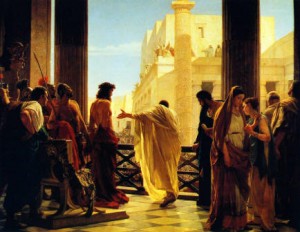My friend and colleague Larry Hurtado, now emeritus at Edinburgh is one of the leading authorities on early Jesus devotion by his followers. Here is a helpful clarifying post of his that he put up a month ago.
——-
On Being Understood (about the Origins of Jesus-Devotion)
by larryhurtado
It’s discouraging to be misunderstood. It happens to others as well. In some cases it may seem entirely accountable to the way that some express their views, e.g., with vague or complicated prose. But, as one of the compliments that I’ve often received (and with much satisfaction) is that I write fairly clear prose, it’s all the more curious when I find that I’ve been unsuccessful with some reader who obviously is skilled and concerned to grasp what I’m trying to say.
One of the topics on which, more than once, I’ve experienced this is how to account for the eruption of such a vibrant devotion to Jesus, including the incorporation of Jesus so centrally in the cultic devotion of circles of believers. From my 1988 book, One God, One Lord: Early Christian Devotion and Ancient Jewish Monotheism (1988, 2nd ed 1998), onward, in several publications, I’ve laid out what I propose are the major “forces and factors” that likely shaped devotion to Jesus and the ways it was expressed, underscoring that we must posit “a dynamic (and varying) combination” of them. In my 2003 book, Lord Jesus Christ, I’ve probably discussed the matter most fully to date, pp. 27-78. The four forces/factors that I propose there are “Jewish Monotheism” (exhbited particularly in the “cultic exclusivity” practiced typically among Jews, and then among Christians too), “Jesus” (particularly the impact of Jesus upon contemporaries, both friendly and hostile), “Religious Experience” (particularly experiences perceived by recipients as “revelatory” in nature), and “the Religious Environment” (of the larger Roman era).
In my analyis of “ancient Jewish monotheism”, with a number of other scholars, I’ve noted that in the second-temple period Jewish concern about “one God” was also able to accommodate this or that figure as a kind of “principal agent” or “vizier”, set over God’s retinue of angels, etc, and in various ways second only to God. (I’ve laid out the specifics at some length in One God, one Lord.) But I’ve also emphasized as crucial that none of these figures is incorporated into the devotional life of ancient Jews in ways that really compare with the role of Jesus in the devotional life of earliest Christian circles. That is, the decisive new thing about Jesus in these circles (in my view) is precisely that: He is quickly and programmatically incorporated into their devotional practice (the specifics laid out likewise in One God, One Lord).
I do propose that ancient Jewish “principal agent” traditions may have provided earliest Jesus-followers with a conceptual category of sorts, the idea that there might be one figure who is God’s “vizier” or chief agent. It seems to me that the christological rhetoric that we find in the NT shows this: Jesus referred to as God’s unique “son” and/or “word”, messiah, etc.
But, equally, this principal agent tradition can’t account for the ways in which Jesus is incorporated into the devotional practice of early believers, the way he receives what looks like “worship”. Something else is required additionally. I’ve proposed that this apparently distinctive “mutation” in devotional practice was prompted by convictions that God wished Jesus to receive this devotion. Further, I’ve proposed that these convictions were generated in religious experiences that struck recipients with the force of “revelation”. In an article published over a decade ago, I’ve laid out more fully my reasoning and the bases (including attention to studies of other major religious innovations): “Religious Experience and Religious Innovation in the New Testament,” Journal of Religion 80 (2000): 183-205 (republished in my book, How on Earth did Jesus Become a God? 2005, pp. 179-204).
It’s a bit of a puzzle and disappointment, therefore, that occasionally I’ve found my position characterized as ascribing the worship of Jesus to Jewish principal agent traditions. And then, of course, the inadequacy of principal agent traditions is pointed out by way of critique. In the way indicated, I do emphasize principal agent traditions as significant (although my friend, Richard Bauckham, disputes this), but I have never ascribed the worship of Jesus to principal agent traditions.
My proposal about the crucial role of revelatory experiences has received some criticism, to be sure. That’s fine, and one can’t object to critical scrutiny. But I do prefer to have critics actually address accurately what I’ve said. That makes for such more helpful conversation:-).













